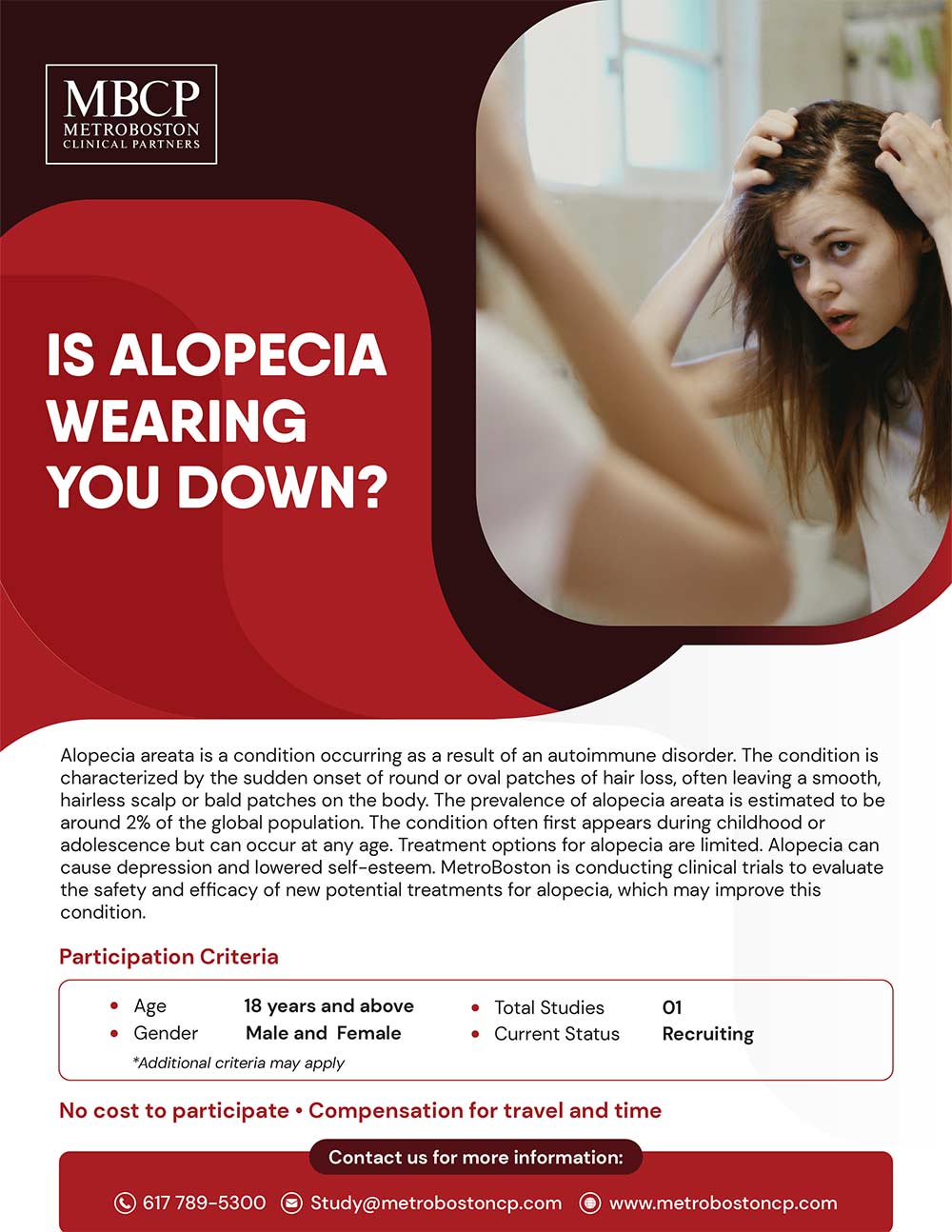Alopecia is a difficult condition to cope with. It alters not only one’s aesthetics but also their life. MetroBoston has set out in the hope of finding a potential treatment. So enroll in our Alopecia Areata Clinical Trials and help us gain deep insights of the disease.
Let’s Beat
Alopecia Areata
Alopecia areata is a condition occurring as a result of an autoimmune disorder. The condition is characterized by the sudden onset of round or oval patches of hair loss, often leaving a smooth, hairless scalp or bald patches on the body. The prevalence of alopecia areata is estimated to be around 2% of the global population. The condition often first appears during childhood or adolescence but can occur at any age. Treatment options for alopecia are limited. Alopecia can cause depression and lowered self-esteem. MetroBoston is conducting Alopecia Areata Clinical Trials to evaluate the safety and efficacy of new potential treatments for alopecia, which may improve this condition. So, if you live in Boston, connect with us by enrolling in our Alopecia Areata Clinical Trials in Boston.
Enroll Now

Safety And Efficacy Evaluation
Eligibility Criteria
Enroll in our Alopecia Areata clinical trial and help us untether the complications of Alopecia.
Age Group
18 years and above
Gender
Male and Female
Current Status
Recruiting
Total Studies
01
Location
Brighton – Boston
About Alopecia Areata

Alopecia areata or Androgenic Alopecia is a common autoimmune disorder that causes hair loss, typically in small, round patches on the scalp or other body parts. It occurs when the immune system mistakenly attacks hair follicles, leading to hair loss. The exact cause of alopecia areata is not fully understood, but it is believed to involve a combination of genetic, environmental, and immunological factors.
Some key points about Patchy Alopecia include:
| Symptoms | Diagnosis | Alopecia Areata Therapy | Prognosis |
|---|---|---|---|
| The main symptom of patchy baldness is the sudden appearance of coin-shaped hair loss patches on the scalp or beard. | Diagnosis of alopecia areata is typically based on a physical examination and medical history. Sometimes, a scalp biopsy or blood tests may be done to rule out other possible causes of hair loss. | Various Alopecia Areata treatments may help manage patchy hair loss and promote regrowth. These may include corticosteroid injections, topical corticosteroids, minoxidil (Rogaine), anthralin cream, immunotherapy, or oral medications such as corticosteroids, JAK inhibitors, or immunosuppressants. | The course of alopecia areata is unpredictable. Hair loss can come and go, and regrowth may occur spontaneously or with treatment. Hair may regrow entirely in some cases, while it may be patchy or not fully restored in others. |
Clinical Trial for Androgenetic Alopecia
Androgenetic Alopecia, commonly known as male pattern baldness, is a hereditary condition that leads to gradual hair thinning and loss, often starting at the temples or crown. It affects millions worldwide and can significantly impact self-confidence. If you’re experiencing hair loss, you may qualify for a clinical trial at PHLstudy.com, where researchers are exploring potential treatments. Visit the website to check your eligibility and see if you can participate in this study.

Frequently Asked Questions
What is alopecia areata?
Alopecia areata is an autoimmune condition that causes hair loss, typically in patches on the scalp.
What are the 4 causes of alopecia?
The four most common causes of Alopecia include Alopecia Areata, Alopecia Areata, Telogen Effluvium, and Trichotillomania.
What triggers alopecia areata?
The exact cause of alopecia areata is not fully understood, but it is believed to be a result of a combination of genetic, autoimmune, and environmental factors.
Things to avoid when you have alopecia areata?
Some of the things you should avoid when you have alopecia are hair manipulation, harsh hair treatment, and sun exposure to the scalp among others.
How do I get rid of my alopecia areata?
There are no certain treatments for Alopecia. However, participating in Alopecia Areata Clinical Trials can help find potential treatments for the condition.